The May 2025 consent resolution involving B.C. principal Pehgee Aranas offers a sobering reminder of the work that remains to make education safe, equitable, and trustworthy for all children—especially those from communities that have been historically harmed by the very institutions meant to support them.
When a young First Nations student was physically punished by a school leader, the breach was not only personal—it was structural. It echoed a long legacy of colonial violence in educational settings and undermined ongoing commitments to truth and reconciliation. That the educator also disregarded directions, disclosed confidential information, and attempted to deflect responsibility onto others only deepened the injury.
This was not an isolated lapse in judgement. It took place in a system where professional standards exist, but where cultural safety and trauma-informed practice are still too often aspirational rather than operational. Where restorative intent is cited in policy, but not always enacted in classrooms or staff rooms. And where the burden of protecting children from harm still falls too heavily on the most vulnerable—on students, on whistleblowers, on grieving communities.
If schools are to be sites of healing and dignity, not harm and erasure, then discipline cannot be separated from ethics, history, or power. This case calls not only for individual accountability, but for a deeper reckoning with how we train, supervise, and support the adults who hold power over children’s daily lives.
What happened
Pehgee Agnes Boholst Aranas, a certified B.C. teacher and elementary school principal at a band-operated First Nations school, spanked a Grade 1 First Nations student (Student A) in November 2023. She then falsely claimed that the child’s parents had approved her actions, made comments inconsistent with reconciliation principles, and shared confidential details of the incident with colleagues—blaming the staff member who reported her.
This followed a prior incident in 2021, where Aranas received a written warning for racist and inappropriate comments, including urging a sick employee to “suck it up” and calling him a “tough native man.”
Consequences
- Aranas’ employment was terminated by the First Nation in May 2024.
- She admitted to professional misconduct, violating Standards #1 and #9 of the BC Professional Standards for Educators.
- A consent resolution imposed the following:
- Three-day suspension of her teaching certificate
- Mandatory completion of two courses:
- Creating a Positive Learning Environment (completed March 2025)
- Systemic Racism in Canada (to be completed by June 30, 2025)
- Prohibition on disputing the facts or terms of the agreement
Implications
This is a serious case involving the physical punishment of an Indigenous child, compounded by dishonesty and institutional defiance. The Commissioner emphasized that Aranas’ actions echoed the abuse legacy of residential schools, reinforced harmful stereotypes, and deeply harmed both the student and the broader community’s trust in education.
While the formal sanctions are limited—a three-day suspension and two professional development courses—the resolution does:
- Officially acknowledge the educator’s violation of ethical and cultural standards
- Aim to support rehabilitation and education rather than solely punitive exclusion
- Reflect that employment consequences had already been imposed by the First Nation
What happened in this case must not be treated as exceptional. It reflects systemic patterns that require sustained, collective response: not just from regulatory bodies, but from school districts, ministries, and training institutions. Accountability means more than identifying individual wrongdoing—it means confronting the environments that permit harm, silence bystanders, and delay justice.
The safety and dignity of Indigenous children cannot hinge on whether their principal understands reconciliation. It must be embedded in every policy, every hiring decision, every professional standard, and every classroom. Until then, we have not done enough.







